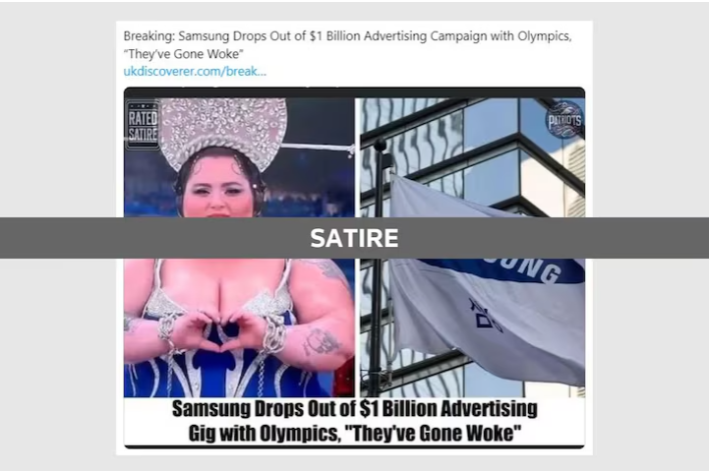Claim: Samsung pulled its billion-dollar ad campaign from Olympics.
Widespread criticism of the Paris Olympics’ controversial opening ceremony has forced organisers to apologise. Now, social media users are claiming that the electronic giant Samsung has pulled back its billion-dollar campaign because the Olympics have allegedly gotten “too woke”.
The opening ceremony that took place on July 26 caused massive outrage, with many claiming that it disrespected Christians.
A narrative online that technology company Samsung pulled a $1 billion Olympics advertising campaign over the competition having become “too woke” originated on a satire website.
One post, shared on Threads, opens new tab on July 29, says: “Breaking: Samsung Drops Out of $1 Billion Advertising Campaign with Olympics, ‘They’ve Gone Woke.’”
The image associated with the narrative on Threads carried a satire label in its top left corner, but some users appeared not to notice it. One individual said in the comments: “Thank you Samsung for not supporting satanists.” Another said: “Everyone should boycott the Olympics at this point … France has fallen.”
A spokesperson for the IOC said to Reuters that the claim is “incorrect,” adding that the IOC has an agreement with Samsung through 2028.
A keyword search did prove reports about Samsung pulling out from the Olympics advertisement campaign. If something like this happened, it would surely be reported widely globally. We went through Samsung’s official social media accounts and saw several Olympics posts with hashtags like #officialpartner and #Paris2024.
On the official website of the International Olympic Committee, we could not find any press releases about Samsung’s withdrawal. The official website of the IOC mentions Samsung as a “global partner”. It also says that the global partnership will continue through 2028.
VERDICT
False. The narrative that Samsung pulled a $1 billion sponsorship deal with the IOC was originally published by a satire website.
For All News junkies
‘Fake news’ refers to false information and news online. However, it’s more appropriate to use ‘misinformation’ and ‘disinformation’.
Misinformation is false information spread by people who think it’s true.
Disinformation is false information spread by people who know it’s false.
Remember, From sock puppet accounts to scam ads, social media can help spread misinformation to thousands if not millions of people at once. Unfortunately, social media algorithms make it so any interaction helps the content reach more people.
Angry reactions on Facebook or comments calling a post out as false only helps the poster reach more people. This is because the algorithm only understands whether something is popular or not. It can’t tell if information is false; that’s why users must report false information rather than engage with it.
Misinformation and disinformation pose a significant threat to societies worldwide, with particularly severe implications for countries like India. Spread of false information is critical risk perceived by experts across the globe. Addressing this challenge requires a multifaceted approach, including media literacy education, robust fact-checking mechanisms, and increased digital literacy among the population.

